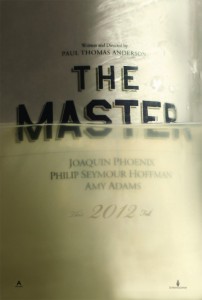
It was written and directed by Paul Thomas Anderson, one of the most acclaimed directors working today. This is is Anderson’s latest effort since There Will Be Blood, a film that topped many best-of-decade lists for prolific movie critics. The Master unquestionably continues this stellar track record.
The story follows Freddie Quell, played by the absolutely astonishing Joaquin Phoenix, a clearly disturbed former soldier fresh out of World War 2. Early on, the film establishes that the world doesn’t quite have a place for people like Freddie. He is easily provoked, a raging alcoholic and can’t hold a job.
After mindlessly wandering through late 1940’s America, Quell spots a large boat hosting quite a party. He stows away onto the ship, only to be confronted by its captain, Lancaster Dodd, played by the always reliable Phillip Seymour Hoffman, who allows him to stay on board. It becomes apparent quickly that Hoffman’s character is captain of more than just the ship they were on. Dodd seems to be in charge of a cult, and Quell becomes its newest member. It’s an extremely original premise that constitutes an absolutely enthralling movie.
The Master isn’t a fast-paced movie per say, but it doesn’t slow down for the viewer. Anderson has a story to tell, and he isn’t going to waste any time making sure the audience understands it. That isn’t to say that the film is incomprehensible, it just has little in the way of exposition, instead forcing the viewer to use context to fill in the gaps of the story. Oftentimes, the viewer will be wondering when, where and why a conversation is taking place, and has to piece it together themselves. This may sound like knock against the film, but it is incredibly rewarding experience to put pieces of the story together while trying to pay attention what is currently occurring on screen.
After a few of these experiences, the viewer’s emotions began to mirror those of Quell and other members of the cult. Dodd was an enrapturing, delightful presence, but left a lot to be desired in a messiah. Just as the viewer begins to seriously doubt him and his plans, so do members of the cult, hinting at the fact that Dodd may not be the savior he claims to be.
Despite the beautiful cinematography, the masterfully edited montages, and atmospheric film score, the performances of The Master are far and away the highlights of the film. Phoenix shines as the unstable Freddie Quell, often making the viewer wonder how disturbed Phoenix is himself. Early on in the film, there is a hypnosis scene between Hoffman and Phoenix’s character that absolutely guarantees either of them an Academy award nomination at the very least. The speed at which Phoenix delivers his gradually more and more emotional answers to Hoffman’s unrelenting questioning is heart-pounding to say the least.
Phoenix has a remarkable chemistry with Hoffman, who is absolutely hypnotic throughout the movie. His character’s charm is infectious, creating a cult leader that is darn near impossible to hate, even making the viewer resent Dodd’s detractors, despite the fact that they are the only voices of reason present in the film. Amy Adams’ controlled, yet disturbed portrayal of his wife, perhaps the cult’s largest fanatic, leaves the viewer in a constant state of discomfort. Being this convincing is the mark of a truly great actress, and is surely a highlight of Adams’ entire career.
Perhaps because of its most difficult aspects, The Master is sure to be one of the best films of the year, and perhaps one of the best in recent memory as well. Anderson takes his sweet time to make his movies, and it is absolutely obvious why. Anderson is somewhat of a cult leader himself, as his films suck the viewer in for its entirety, and the The Master is no exception.








